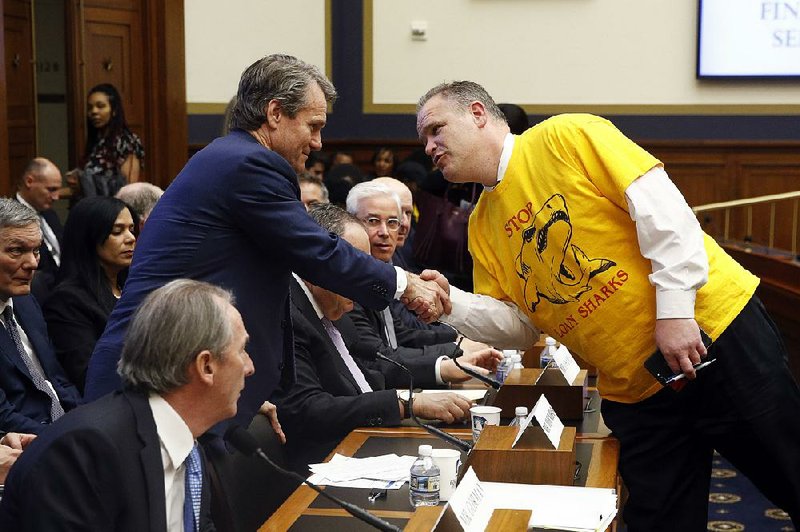NEW YORK -- The heads of seven of the largest banks in the U.S. fielded sometimes contentious questions from a House committee Wednesday, some dealing with current risks to the financial system and others focused on more politically charged topics.
The appearance by the chief executive officers of JPMorgan Chase, Goldman Sachs and five other banks represented the largest gathering of leaders of the banking industry before Congress since the financial crisis.
The CEOs told members of the House Financial Services Committee that they've taken steps to improve the stability of their institutions since the financial system nearly seized up in 2008. The banks have raised capital, are more diverse, and are more resilient than they were before the financial crisis, the CEOs said.
"There is no doubt that the strength, stability and resiliency of the financial system has been fundamentally improved over the course of the last ten years," said Jamie Dimon of JPMorgan. "Post-crisis reforms have made banks much safer and sounder in three important areas: capital, liquidity and resolution and recovery."
The backdrop of the hearing is the 10-year anniversary of the 2008-2009 financial crisis. The banking system required extraordinary efforts by regulators -- and a bailout by U.S. taxpayers -- in order to survive. All seven banks appearing in front of Congress received funds under the $700 billion Troubled Asset Relief Program, and all paid billions of dollars in penalties and fines for their behavior heading into the housing bubble.
"I am concerned that several of these institutions are simply too big to manage their own operations, too big to serve our communities and too big to care about the harm they have caused," said Rep. Maxine Waters, D-Calif., who is the chairman of the Financial Services Committee.
The hearing had some policy questions, but many members of Congress took their time to ask politically charged questions of the CEOs on topics including gun regulations and executive compensation. Democrats took their time to laud Bank of America and Citigroup's decision not to finance gun-manufacturing companies, while Republicans took their turns to lambaste them.
Rep. Jim Himes, D-Conn., asked all CEOs what they considered to be the products or businesses most at risk in the banking system. No CEOs mentioned home mortgages -- the product that caused the 2008 financial crisis -- but instead the two dominant answers were cybersecurity risks and growth of leveraged corporate lending, or lending to companies with already large debt loads. Another threat mentioned was "shadow banks," which is a term used to describe nonbank companies getting into financial products, particularly financial technology companies.
A Republican congressman, Steve Stivers of Ohio, asked the CEOs what they considered the biggest nonbusiness risks to the banking system. The CEOs talked about how economic growth is slowing across the globe, and they again mentioned cybersecurity as a big risk to the banking industry.
Along with Dimon, among those appearing were David Solomon of Goldman Sachs, Brian Moynihan of Bank of America, James Gorman of Morgan Stanley, Michael Corbat of Citigroup, Charles W. Scharf of Bank of New York Mellon and Joseph L. Hooley of State Street Corp. One executive not at the hearing was Tim Sloan, who resigned from his position at Wells Fargo last week, days after a separate appearance before the same committee.
Only one of the seven banks has the same leader as it did 10 years ago: Dimon.
The hearing comes after the banking industry had a record year for profits in 2018, thanks partly to the tax cuts passed by Republicans in late 2017. Meanwhile, the banking industry's lobbyists have been pushing Congress to further unwind the rules and regulations put into place after the 2008 financial crisis.
Lawmakers grilled the chief executives -- all white men -- on the diversity of their companies, their overdraft policies and what steps they take to help distressed borrowers. Inside the packed hearing room, a television showed the multimillion-dollar salaries of the chief executives and how much they had paid in fines to regulators.
Corbat's salary of $24 million last year was 486 times bigger than the median salary of Citigroup's employees, the highest disparity among the banks, said Rep. Nydia Velazquez, D-N.Y. "Do you think that's fair?" Velazquez asked. "It doesn't look good."
"My compensation is decided by the board," said Corbat, adding that he acknowledges that he is fortunate.
The Democratic takeover of the House has intensified scrutiny on big banks, and the industry is hoping to use the hearing to focus attention on the positive changes they have made since the crisis. The concern for bankers is that the hearing is merely a preview of the intense scrutiny the industry will undergo in the run-up to the 2020 presidential election.
Bruce Marks from the Neighborhood Assistance Corp. of America, a housing advocacy group, interrupted testimony from Bank of America's Moynihan. As Marks stood and began shouting, Waters told him to leave.
"Would you please remove this gentleman from my committee?" said Waters, who had started the hearing by acknowledging Marks' attendance. "Come on officers, I don't have a lot of time, get him out of here."
Information for this article was contributed by Ken Sweet of The Associated Press and by Renae Merle of The Washington Post.
Business on 04/11/2019
